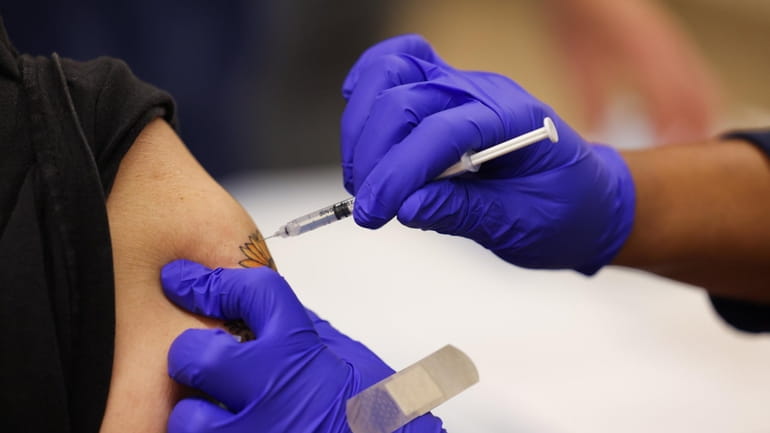CDC recommends spring COVID-19 vaccine for older adults

A Pfizer COVID-19 vaccine booster shot is administered at the Mount Sinai South Nassau Vaxmobile. Credit: Newsday/Steve Pfost
Older adults should get yet another dose of the COVID-19 vaccine this spring even if they got one in the fall, the Centers for Disease Control and Prevention advised Wednesday.
The advice came after an agency advisory committee voted 11-1 to recommend the vaccination for those age 65 and older, as long as at least four months have passed since the prior one. The vaccine is the same formulation as was offered last fall.
CDC Director Mandy Cohen endorsed the recommendation within hours of the panel's vote.
"The recommendation acknowledges the increased risk of severe disease from COVID-19 in older adults, along with the currently available data on vaccine effectiveness," said a statement accompanying her endorsement.
CDC data shows that people who received the updated COVID-19 vaccine were 54% less likely to get COVID-19 during the four-month period from mid-September to January.
Adults 65 years and older are disproportionately impacted by COVID-19, with more than half of COVID-19 hospitalizations during October 2023 to December 2023 occurring in this age group, the CDC said.
The panel's decision came after a lengthy discussion about whether to say older people “may” get the shots or if they “should” do so. That reflects a debate among experts about how necessary another shot is and whether yet another recommendation will add to the public's growing vaccine fatigue.
Some doctors say most older adults are adequately protected by the fall shot, which built on immunity derived from earlier vaccinations and exposure to the virus itself. And preliminary studies so far have shown no substantial waning in vaccine effectiveness over six months.
But the body's vaccine-induced defenses tend to fade over time, and that happens faster in seniors than in other adults. The committee had recommended COVID-19 booster doses for older adults in 2022 and 2023.
Dr. Roy Gulick, chief of infectious diseases at NewYork-Presbyterian Hospital/Weill Cornell Medical Center, said a second dose of the shot administered in the fall can help bolster protection against the effects of COVID-19, particularly for those at highest risk.
“It actually better covers the omicron variants that are circulating right now,” he said.
According to New York State's COVID-19 vaccine tracker, 11.9% of the state population has gotten the updated doses of the vaccine approved in the fall: 8.7% in Suffolk and 9.4% in Nassau.
Dr. Leonard Krilov, an NYU Langone Hospital-Long Island physician who specializes in pediatric infectious disease, said the CDC's move Wednesday doesn't change his existing recommendation for healthy kids but complements it — all kids ages 5 and older should get at least one dose of the most recent available vaccine), and babies 6 months to 4 years should start the COVID vaccine series, which would be the fall formulation.
"The vaccine is still safer and better protection than getting the disease itself," said Krilov, who also chairs the hospital's pediatrics department.
COVID-19 remains a danger, especially to older people. There are still more than 20,000 hospitalizations and more than 2,000 deaths each week due to the coronavirus, according to the CDC.
Some members of the advisory panel said a “should” recommendation is meant to more clearly prod doctors and pharmacists to offer the shots.
“Most people are coming in either wanting the vaccine or not,” said Dr. Jamie Loehr, a committee member and family doctor in upstate Ithaca. “I am trying to make it easier for providers to say, 'Yes, we recommend this.'”
With AP
Older adults should get yet another dose of the COVID-19 vaccine this spring even if they got one in the fall, the Centers for Disease Control and Prevention advised Wednesday.
The advice came after an agency advisory committee voted 11-1 to recommend the vaccination for those age 65 and older, as long as at least four months have passed since the prior one. The vaccine is the same formulation as was offered last fall.
CDC Director Mandy Cohen endorsed the recommendation within hours of the panel's vote.
"The recommendation acknowledges the increased risk of severe disease from COVID-19 in older adults, along with the currently available data on vaccine effectiveness," said a statement accompanying her endorsement.
CDC data shows that people who received the updated COVID-19 vaccine were 54% less likely to get COVID-19 during the four-month period from mid-September to January.
Adults 65 years and older are disproportionately impacted by COVID-19, with more than half of COVID-19 hospitalizations during October 2023 to December 2023 occurring in this age group, the CDC said.
The panel's decision came after a lengthy discussion about whether to say older people “may” get the shots or if they “should” do so. That reflects a debate among experts about how necessary another shot is and whether yet another recommendation will add to the public's growing vaccine fatigue.
Some doctors say most older adults are adequately protected by the fall shot, which built on immunity derived from earlier vaccinations and exposure to the virus itself. And preliminary studies so far have shown no substantial waning in vaccine effectiveness over six months.
But the body's vaccine-induced defenses tend to fade over time, and that happens faster in seniors than in other adults. The committee had recommended COVID-19 booster doses for older adults in 2022 and 2023.
Dr. Roy Gulick, chief of infectious diseases at NewYork-Presbyterian Hospital/Weill Cornell Medical Center, said a second dose of the shot administered in the fall can help bolster protection against the effects of COVID-19, particularly for those at highest risk.
“It actually better covers the omicron variants that are circulating right now,” he said.
According to New York State's COVID-19 vaccine tracker, 11.9% of the state population has gotten the updated doses of the vaccine approved in the fall: 8.7% in Suffolk and 9.4% in Nassau.
Dr. Leonard Krilov, an NYU Langone Hospital-Long Island physician who specializes in pediatric infectious disease, said the CDC's move Wednesday doesn't change his existing recommendation for healthy kids but complements it — all kids ages 5 and older should get at least one dose of the most recent available vaccine), and babies 6 months to 4 years should start the COVID vaccine series, which would be the fall formulation.
"The vaccine is still safer and better protection than getting the disease itself," said Krilov, who also chairs the hospital's pediatrics department.
COVID-19 remains a danger, especially to older people. There are still more than 20,000 hospitalizations and more than 2,000 deaths each week due to the coronavirus, according to the CDC.
Some members of the advisory panel said a “should” recommendation is meant to more clearly prod doctors and pharmacists to offer the shots.
“Most people are coming in either wanting the vaccine or not,” said Dr. Jamie Loehr, a committee member and family doctor in upstate Ithaca. “I am trying to make it easier for providers to say, 'Yes, we recommend this.'”
With AP

